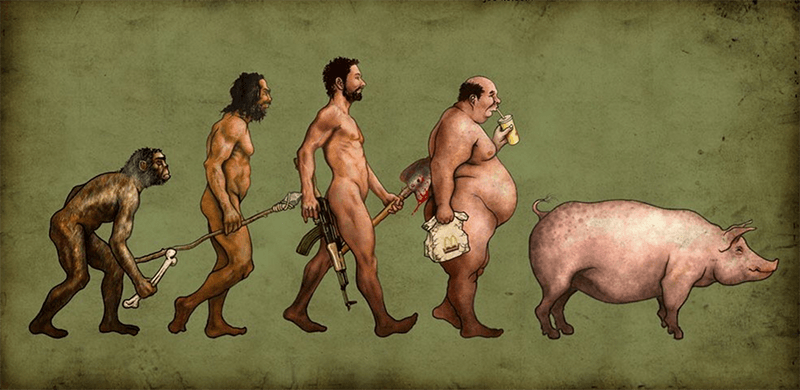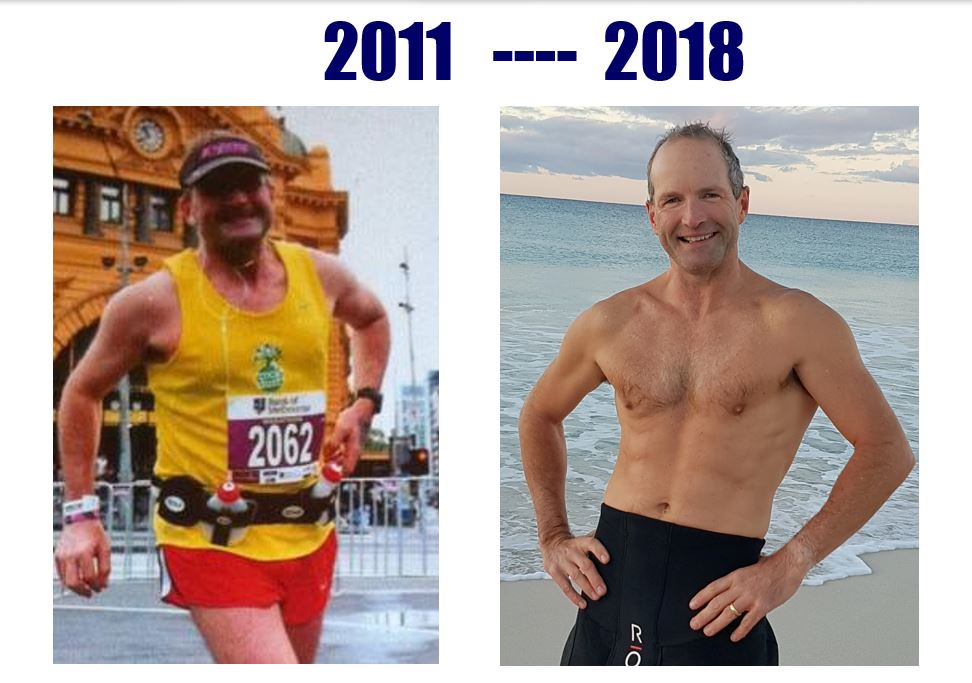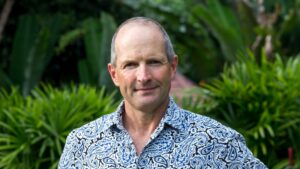
Recently, I was asked by a gym member what I thought about an article titled “5 Reasons Carbs Are Not The Enemy” which was written by a dietitian and published on the website of one of the gyms (Goodlife Health Clubs) where I work.
Aside from agreeing with the first two lines of the article, I pretty much disagree with everything else – and here’s why. The article misses the mark on some of the most basic principles of metabolism, it mischaracterizes the low-carbohydrate diet, and it ignores the latest scientific evidence.
1. The author claims that carbohydrates “help to balance your energy levels” and justifies this by saying that low glycaemic index (GI) foods help achieve a “steady, stable stream of energy for two or more hours post consumption”. This is plainly wrong.
When researchers actually put this to the test under experimental conditions, they found that after ingesting carb-laden food with a known GI, the blood glucose response in 63 different people was so wildly varied and unpredictable that the researchers had to conclude that the “GI” value of food could not be used to predict anyone’s glycaemic response.[1]
Nutritionist Jennifer Elliott published a detailed critique of the flawed GI concept in a submission to the Western Australian Government’s investigation into type-2 diabetes (T2DM) prevention and management. She wrote:
“GI ranking of foods [is] one of the most inane concepts in the world of nutrition, despite reasonable competition… The harm caused to people with diabetes in putting their faith in the GI as a way to make food choices that will help manage their condition, instead of a method with a sound physiological basis and proven benefits eg reducing carbohydrate intake, is potentially immense.”[2]
It only takes common sense to realize that minimally processed foods and whole foods like eggs, fish, meat, and butter do not cause dramatic spikes in blood glucose levels; they provide sustained satiety and should constitute the majority of your diet.
The article posted on the gym’s website also claims that “very few people can maintain a low-carb diet beyond 3-6 months, without negative side effects.” A recent peer-reviewed study led by Dr. Sarah Hallberg published in Diabetes Review[3] demonstrated long-term adherence to a low-carb diet that included healthy, satiating fats. The study, funded by Virta, presented data from the first 12 months of a five-year study investigating standard-of-care, low-fat, and low-carb therapies.
I myself have been following an LCHF approach to nutrition for six years, and it is easy. What I find frustrating is when we are constantly told by so-called experts that our brains are going to stop working if we don’t eat enough carbs.
The truth is that on low-carb diets, once we become “fat burners” instead of “carb burners”, our brains can also use ketones (a byproduct of fat metabolism) as a supplementary fuel source.
I have personally coached over 200[4] people over the last three years to improve their health and move away from the poor advice being disseminated to the public. The majority of them are still following their new lifestyles and are loving it.

Professor Tim Noakes,[5] who founded the Sports Science Institute of South Africa and was awarded the prestigious South African Association for the Advancement of Science prize, also adopted an LCHF approach six years ago after his father died from T2DM.
Prof. Noakes was shocked after he himself developed T2DM despite being a fit marathon runner. He blamed the constant “carb loading” he did in preparation for his marathons as well as his family history. As a result, he has become one of the world’s biggest advocates for LCHF and has established a research foundation[6] to help turn the tide on obesity and diabetes.
2. The article claims that carbs are “essential for exercise performance.” However, one of the most enduring myths about carbohydrates is that they are “essential” in the diet. Even the most basic biochemistry book will tell you that dietary carbohydrate is not essential macronutrient,[7], unlike protein and fat.
I am not suggesting that we remove all carbohydrates from our diet, as the consumption of appropriate vegetables, depending on your own level of insulin resistance, body composition, and intensity of exercise are important considerations.
The key point is that you do not need to consume carbohydrates because your body can synthesize all the glucose your body needs to carry out the biological process of growth and metabolism. The liver is able to perform this function in a process known as gluconeogenesis.
Research by Dr. Eric Westman analyzed the traditional diets and health statuses of the Inuit, who ate very low-carb high-fat diets, and it clearly shows that these people were very healthy and able to work very hard for weeks and months without ingesting carbohydrates.[8]
While there are healthy populations that have eaten relatively high-carbohydrate diets compared to the Inuit, or the Maasai in Tanzania and Kenya in general, the world has become obese and sick by following the mantra that we need to eat mostly carbs and should not deprive ourselves of them.
There is growing anecdotal evidence that marathon runners and those participating in Iron Man and other ultra-triathlon events have improved their performance after reducing their daily intake of carbohydrate-rich foods.[9]
If you’re interested in hearing more, there is a podcast featuring Stefano Passarello, a CEO based in Hong Kong, who has attained the highest level of triathlon success in his very first year in the sport.
A 2:26 marathon runner who turned to triathlons due to repeated injuries, Stefano qualified for the Hawaii Ironman World Championships and ran a 2:53 marathon off the bike in Kona! This is the third fastest amateur marathon split in the 40-year history of the Ironman!
Stefano’s approach to nutrition is ultra-low-carb.[10][11]

From my own experience over the last six years, I have been training 15 hours a week for Half Ironman and marathons and my performance has increased. I train endurance athletes, all of who follow an LCHF approach to nutrition and it works. Some of the world’s best endurance athletes follow this approach.
I also know from personal experience, when I was following the advice of a highly qualified (but mainstream) nutritionist, I was overweight, frequently injured, and always hungry and stressed. Since sacking them and moving to an LCHF approach, I have been between 64-66kg for six years and running and performing faster than when I was 48.

Interestingly, Virta co-founder and CEO Sami Inkinen[12] won his age group at the Ironman 70.3 World Championships only to find out that the same year, he had prediabetes. Unsatisfied with the conventional wisdom of “exercise more and eat less,” Sami delved into the causes of T2DM, leading him to Drs. Stephen Phinney and Jeff Volek, renowned experts on the science of carbohydrate restriction and metabolic health. In a recent blog they wrote:
“Published science has shown that ketones that are produced from either dietary fats or triglycerides stored in our adipose tissue reserves are an excellent fuel for the brain. Further, we now know that these ketones produced by the liver also have multiple beneficial effects on the heart, kidneys, and other organs that appear to translate into improved longevity.[13] [14] [15]
Additionally, new research has highlighted that skeletal muscles, even those of competitive athletes, are not solely dependent on high dietary carbohydrate intake for glycogen replenishment and performance [16].”

Sami Inkinen 2011 Ironman World Championships
Getting back to the article about why you allegedly “need to be eating carbs”, the author also falsely states that if you are “not consuming enough carbohydrates to fuel your exercise, replenish glycogen stores and support essential bodily functions, there is a risk your protein intake will be used for these tasks, and not for muscle growth and repair”, and that this will leave you “vulnerable to injury and illness in the long term.”
This statement is breathtaking, as is the claim that if you are looking to build size and muscle mass, carbohydrates can help you “reach the calorie surplus you need.” To understand how misleading this claim actually is, you only have to read the seminal work of Phinney and Volek: The Art and Science of Low Carbohydrate Performance.
Phinney is a physician and Volek is a dietitian and former champion powerlifter; both have been on a ketogenic (very low-carb, very high-fat, moderate-protein) diet for upward of two decades. They also happen to be two of the world’s foremost experts on the topic of carbohydrates and sports performance.
3. The article claims that high-fiber carbohydrate foods promote bowel health. However, a closer analysis of the literature has led doctors to believe that the benefits of fiber have been oversold.
For example, a well-designed study showed that issues relating to constipation, bloating, bleeding, and pain significantly improved when people cut fiber from their diet.[17]
In a recent issue of the New England Journal of Medicine, there was a major review article on the causes and treatment of Irritable Bowel Syndrome (IBS).[18] One of the points discussed was the role of fiber in bowel function.
For years, modern gastroenterology has put an emphasis on the fiber theory of bowel function which, briefly stated, is the theory that those who consume lots of fiber will have healthy bowel function. Fiber, by the way, is a term that encompasses the family of complex carbohydrates and other substances that are present mainly in the cell walls of plants used as food.
The term includes cellulose, gums, mucilages, pectins, and lignins. Humans cannot digest fiber, and yet these substances are said to contribute to the health of the digestive tract.
Rather than focusing entirely on fiber, we should look at the intestines as a complex ecosystem. Like all ecosystems, the intestines are populated by a wide variety of organisms, all of which interact with each other and their host.
Each organism needs to be fed and its waste products eliminated, and each individual organism and the organisms as a whole have a profound connection with the health or disease of their host.
The big problem with legumes and whole grains is the fact that they can cause serious damage to our digestion, which can lead to mineral deficiencies in the body. As discussed in the reference from the Weston A.
Price Foundation,[19] phytic acid in grains, nuts, seeds, and beans represents a serious problem in our diets. This problem exists because we have lost touch with our ancestral heritage of food preparation. Instead, we listen to “food gurus” and ivory tower theorists, and we eat a lot of high-phytate foods like commercial whole wheat bread and all-bran breakfast cereals, both of which often contain high amounts of sugar.
The author uses epidemiological studies to justify this claim. However, these types of studies are often fraught with limitations because epidemiological studies that show a “weak association” between two factors cannot prove causation.
For example, the idea that vegetarians are healthier than meat eaters is likely to be because the latter group might smoke more or exercise less – in other words, it may have nothing to do with their meat consumption.
On the other hand, there is a considerable amount of evidence from randomized controlled trials (RCTs, the so-called “gold standard of modern science) to show that low-carb diets are more effective at managing diabetes and weight gain compared to low-fat diets.
The article also claims that low-carb diets are “trendy”, ignoring the fact that this nutrition approach was the gold standard treatment for people with type-1 diabetes before the development of medications like insulin.
For further reading, I’d recommend the works of US science writer Gary Taubes, author of Why We Get Fat and What To Do About It, and Nina Teicholz’s ground-breaking work Big Fat Surprise: Why Butter, Meat and Cheese Belong in a Healthy Diet.
Is Goodlife Health Club and the fitness industry as a whole focused on the health and well-being of its members and the community?
Misleading advice from articles like the one I write about here is sure to keep its members overweight and struggling to be fit and healthy, which in turn will keep the fitness industry filling the classes and booking those PT sessions.
I feel quite strongly about this issue, and I’m concerned about the conflicts of interest that exist for the fitness industry at large in terms of delivering appropriate, unbiased messages to the community while trying to maintain its profit margin.
It is time to step up and consider this and to really think about the misinformation that is being peddled to the public in an attempt to capture your business.

Andre Obradovic is an ICF Leadership PPC Level Coach, A Primal Health Coach, a Certified Low Carb Healthy Fat Coach, & a Certified Personal Trainer. Andre is also a Founding member of the Dr. Phil Maffetone MAF certified Coach. He is an Ambassador for the Noakes Foundation, and a regular subject matter expert lecturer for the Nutrition Network (a part of the Noakes Foundation) Andre has completed 16 x 70.3 Ironmans and in 2017 he competed in the 70.3 Ironman World Championships. He has completed 18 Marathons and over 30 Half Marathons. Andre currently focuses his athletic competition on Track and Field with the occasional Marathon.
[1] https://www.ncbi.nlm.nih.gov/pubmed/27604773
[2]http://www.parliament.wa.gov.au/Parliament/commit.nsf/(EvidenceOnly)/44D0D4EEDB83D60C482582F20028F824?opendocument
[3] https://www.virtahealth.com/blog/2yr-t2d-trial-outcomes-virta-nutritional-ketosis
[4] https://en.wikipedia.org/wiki/Tim_Noakes
[5] https://thenoakesfoundation.org/
[6] https://www.ncbi.nlm.nih.gov/pubmed/10365996?dopt=Abstract
[7] https://academic.oup.com/ajcn/article/86/2/276/4633078
[8]https://www.triathlete.com/2016/10/nutrition/ironman-legend-dave-scott-shares-nutrition-tips_295422
[9] https://primalendurance.libsyn.com/episode-131
[10] https://profgrant.com/2014/03/04/how-to-win-the-ironman-on-lchf/
[11] http://www.samiinkinen.com/post/11347268687/hawaii-ironman-secrets
[12] https://www.ncbi.nlm.nih.gov/pubmed/19549860
[13] https://www.ncbi.nlm.nih.gov/pubmed/25193333
[14] https://www.ncbi.nlm.nih.gov/pubmed/28877457
[15] https://www.ncbi.nlm.nih.gov/pubmed/26892521
[16] https://www.ncbi.nlm.nih.gov/pmc/articles/PMC3435786/pdf/WJG-18-4593.pdf
[17] https://www.nejm.org/doi/full/10.1056/NEJMra1607547
[18] https://www.westonaprice.org/health-topics/vegetarianism-and-plant-foods/living-with-phytic-acid/
Grr - please can you reply to the ignorant author of this article:
http://eu.ironman.com/triathlon/news/articles/2019/05/keto-and-the-endurance-athlete.aspx#axzz5nLhKUOpU
dated this week! So many inaccuracies and falsehoods. Thanks for all your good work - we keep waving the LCHF banner!!
thanks Liz. Some of the points Susan makes are valid. But some are a bit bias. I have written on this already and it was pblished in USA Triathlon Coaches Corner here is the link.
https://www.teamusa.org/USA-Triathlon/News/Blogs/My-Story/2016/July/19/Fat-Adaptation-for-Endurance-Performance
Or
https://andreobradov.wpengine.com/fat-adaptation-for-endurance-performance/
thanks for your comments.. in the end there needs to be a balance for each person between stress exercise body composition and level of carbs required based on each and every person. It is very very individual we are all unique.
[…] https://andreobradovic.com/do-we-really-need-to-eat-carbs/ […]